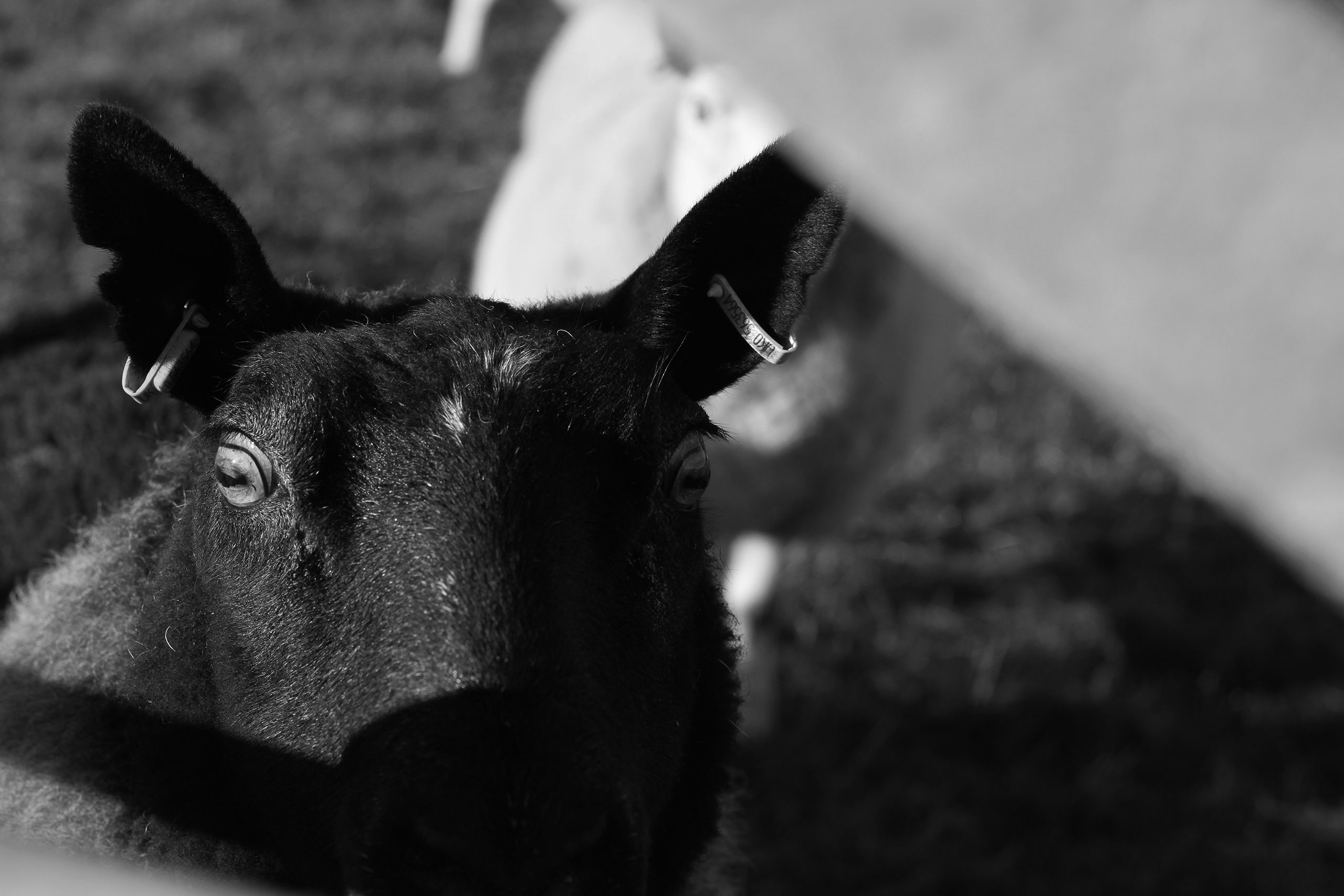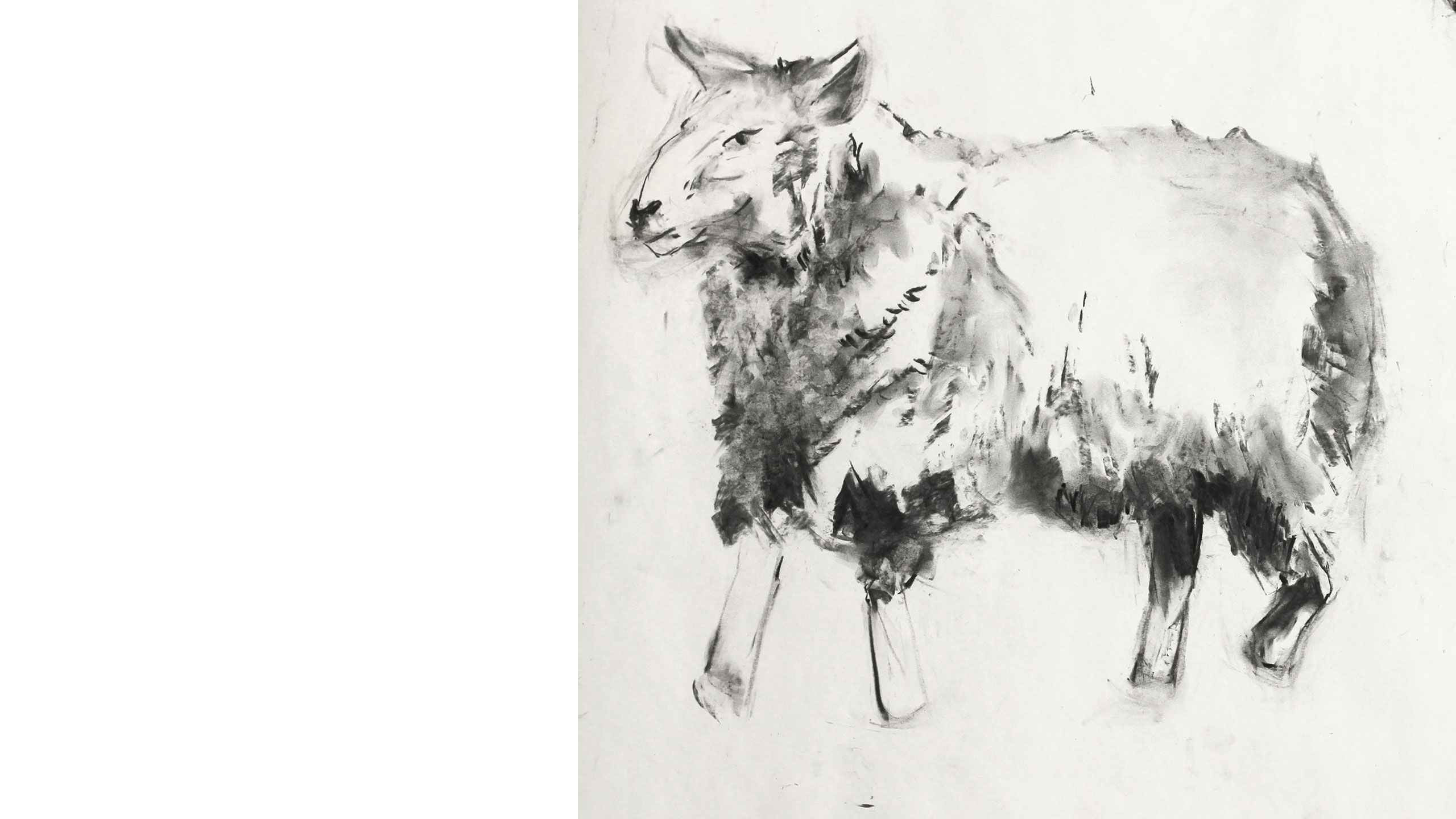HOW DO SHEEP SEE US?
Shane Finan is an artist who has spent six months researching the behaviours of sheep living in Northern England and Ireland.
I have spent many hours in different fields with different sheep and come back to the same questions:

How do we see them?
How do they see us?
I grew up in North West Ireland, surrounded by sheep. Climbing the mountains, you look down on land that is shaped by areas of green and brown, marked by hedgerows and boundaries.
Inside each of these shapes are clusters of white dots that look like a moss or a fungus growing on the hillsides.
I thought I knew sheep but I was wrong.
For six months I’ve met with farmers to find out how they deal with livestock disease and how it affects their lives and the lives of the animals they look after. I was looking for new and unexpected connections that would challenge my views about farming and maybe offer new perspectives on the lives of livestock animals - sheep in particular.
I’ve met sheep with conditions like lameness and diseases like scald or footrot. I’ve also met sheep who have had injuries that make it difficult for them to walk. The first was in Scotland. She was a hill sheep who was recently taken to lower ground to be treated. The ewe was a touch wild and not used to humans. She kept her distance and moved away if I came closer.

I met another ewe in a field in the North of England. Fransje the farmer had given her the name Dandelion. Dandelion showed her vulnerability almost immediately, as we entered a field, she kept her distance and emptied her bladder, Fransje said this was to make her lighter so she can run away quicker. Dandelion had a problem with two of her hooves which caused her to limp.
Dandelion was part of a small flock, the other ewes slowly approached me but Dandelion kept a distance. She acted up, bullying another ewe that was new to the herd despite the fact that this clearly caused her pain. By acting up Dandelion could appear stronger and healthier.
In the end Dandelion approached me, only to freeze around three metres away. She stood still staring at me. Dandelion saw me as two things: both a threat and a friend. The fear of threat meant she kept her distance.
To approach me and then stop, Dandelion had to understand her own vulnerability, and have a sense of my intention. That involves a level of complex thinking.
How does the society we live in shape the way we think about livestock like sheep and cows?
The philosopher Vinciane Despret has interesting things to say about how we look and think about animals in her book What Would Animals Say If We Asked the Right Questions?
Thelma Rowell is a scientist who studies monkeys and apes. In 1972 she wrote a book called The Social Behaviour of Monkeys. As she got older she started looking at sheep and would watch them everyday near where she lived in North Yorkshire. She observed that, to sheep, humans are seen as both a predator and protector. We are a threat but we also protect them from bigger threats like wolves or dogs.
I cannot see the world from the mind of a sheep but I can imagine it.
In 2016, I broke my shoulder in a bicycle accident. I was living in Dublin City and had to take a bus to go to work. With my arm in a sling, I remember the fear of someone bumping into me, or worse, someone trying to attack or rob me.
We have all been in situations where we feel vulnerable and this made me think about the limping Dandelion in the field in the North of England.
Can we imagine what a sheep sees through our human eyes? I went into a field seeking creative ideas about what links farmers, animals and disease, but what I found was vulnerability and a new found empathy.



Humans like certainties and simple definitions of the world - black and white, good and bad, right and wrong.
Farming involves lots of contradictions. Farmers have to show care, attention and a tremendous amount of consideration for the animals they breed and raise. But they also have to think about the realities of the farming industry, the animals they care for are livestock mostly bred for food and clothing for humans to consume.The complexity of stewarding animals is not as simple as just raising and cutting down a cash crop. Animals have individual personalities; they have behaviours and motivations that we can’t always understand. Farmers know this, and see it constantly.
In six months, I have visited ten farms in the UK and Ireland. On each farm the farmers’ perspectives were vastly different. Some justify their decisions and work by money alone - ‘this is a business and animals are stock’ - Others insist that the most important thing is care for the animals - ‘the animals should have one bad day’.
All the farmers I met presented varying degrees of care, attention and cold detachment; some would often contradict themselves.
One farmer insisted that they would never keep animals that were prone to disease, as this would breed weakness into future generations. Within the same afternoon the same farmer would introduce me to a ewe that had consistent health problems but was being kept alive in the hope that she would recover and ‘become stronger for it’. The same farmer admitted ‘I must be getting soft’.To raise and care for an animal and then kill it must be difficult. As a society we are sometimes sheltered from the realities of life and death. Livestock farmers accept death as a healthy part of life probably better than the majority of us. Care and coldness both have a place in their world and the death of the animal is viewed as part of a cycle of renewal.
Somewhere between the care and coldness required to be a farmer lies the truth about farming.
Shane Finan is an artist and curator from Ireland. He uses digital technology alongside more traditional art practices responding to contemporary research on environmental and scientific themes. He has exhibited in Ireland, Iceland, China, the USA and the UK.
shanefinan.org
For six months Shane interviewed farmers and observed the behaviours of sheep across the North of England and Ireland. A Detached Touch is a series of online stories created by Shane for FIELD that ask us to consider how we see sheep and farmers, and how they in turn might see us.
field.shanefinan.org
All content © Shane Finan 2020
